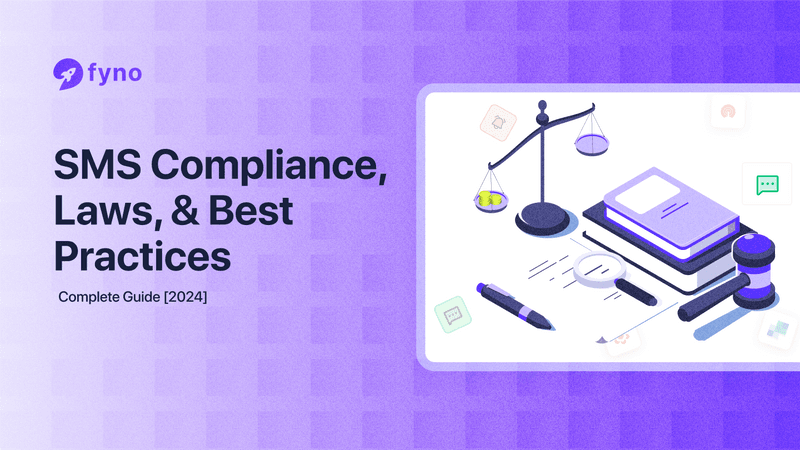In today's fast-paced digital world, SMS remains a powerful tool for business communication. However, navigating the intricate landscape of SMS compliance is crucial to avoid legal pitfalls and maintain consumer trust.
This comprehensive guide for 2024 delves into SMS compliance, laws, and best practices, equipping businesses with the knowledge to adhere to regulatory standards and optimize their SMS marketing strategies

What is SMS compliance?
SMS compliance refers to the legal and regulatory framework governing the use of text messaging for business communications. Compliance ensures that businesses follow established rules to protect consumers from spam, fraud, and other unsolicited text messages. Adhering to these rules helps maintain consumer trust and avoids hefty fines and penalties.
Why is SMS compliance important?
Compliance with these rules is not just about avoiding penalties but respecting consumer preferences and building a reputable brand. For example, a logistics company must ensure that all promotional text messages include opt-out instructions and are sent only to those with prior express written consent.
Understanding and implementing SMS compliance is crucial for banking and financial services businesses.
Regulatory framework
Navigating the regulatory landscape of SMS compliance is crucial for businesses. Regulatory frameworks ensure that SMS marketing and text messaging programs adhere to legal standards, protecting both businesses and consumers. Understanding these regulations helps avoid hefty fines and builds trust with customers.
Several laws and guidelines govern SMS compliance. The primary regulations are listed below.
The Telephone Consumer Protection Act (TCPA)
The Cellular Telecommunications Industry Association (CTIA) guidelines, and
The General Data Protection Regulation (GDPR)
These regulations set the standards for obtaining express written consent, handling opt-out requests, and managing message frequency.
Compliance with these regulations is essential for businesses. Failing to comply can lead to penalties and damage the company's reputation. Therefore, it is vital to stay updated with any changes in these laws and implement best practices to ensure adherence.
The Telephone Consumer Protection Act (TCPA)
Obtaining express written consent: Businesses must obtain prior express written consent from consumers before sending SMS marketing messages or making phone calls. This can be done through a double opt-in process, where consumers confirm their consent twice, ensuring they know what they are signing up for.
opt-out instructions: Every SMS message must include clear instructions on how recipients can opt-out. This ensures that consumers can easily stop receiving messages if they choose to.
Message and data rates: Inform consumers that the rates may apply. This transparency helps in maintaining trust and compliance with TCPA regulations.
Message frequency: Clearly state the frequency of messages to be sent. This helps in managing consumer expectations and reduces the chances of complaints.
Record keeping: Maintain records of all consents and opt-outs. This documentation is crucial in case of any legal disputes or audits.
The Cellular Telecommunications Industry Association (CTIA) guidelines
Consumer protection: The CTIA guidelines emphasize protecting consumers from spam and unwanted messages. Businesses must ensure they do not send unsolicited text messages, adhering to the best practices outlined by the CTIA.
Message content: Ensure that the content of SMS messages is relevant and valuable to the recipients. Avoid sending messages related to sex, hate, alcohol, and firearms, which are prohibited by CTIA guidelines.
opt-In and opt-out processes: Similar to TCPA, CTIA requires clear opt-in and opt-out processes. Businesses must make it easy for consumers to join and leave SMS programs.
Audits and compliance reviews: Conduct audits and compliance reviews regularly to ensure that SMS campaigns adhere to CTIA guidelines. This proactive approach helps identify and rectify compliance issues.
The General Data Protection Regulation (GDPR)
Data protection: Under GDPR, businesses must protect consumers' personal data. This includes ensuring the security of phone numbers and other information collected during SMS campaigns.
Consent management: Before sending EU citizens SMS messages, obtain explicit consent that is freely given, specific, informed, and unambiguous.
Data minimization: Only collect the necessary data for SMS campaigns. Avoid gathering excessive information that is not required for the campaign's purpose.
Right to access and erasure: Consumers can access their data and request its deletion. Businesses must provide mechanisms for consumers to exercise these rights easily.
By understanding and adhering to these regulatory frameworks, businesses can effectively manage their SMS marketing campaigns while staying compliant with the laws. This not only helps in avoiding legal repercussions but also builds a positive reputation among consumers.
Consent and opt-in
Obtaining proper consent is crucial to ensure SMS compliance. This protects consumers from unsolicited text messages. Clear opt-in mechanisms are essential for legal and effective SMS campaigns.

Obtaining express written consent
Clear disclosure: Inform potential subscribers about the frequency of messages and the nature of the content they will receive.
Opt-in confirmation: Double opt-in to confirm the subscriber's consent. This involves sending a confirmation message after the initial opt-in request.
Document consent: Keep records of all consents obtained, including the time and date. This documentation is crucial for compliance verification.
Opt-out information: Ensure that opt-out instructions are clearly provided during the consent collection process.
Best practices for consent collection
Transparency: Clearly state the terms of your SMS program. Include information on message frequency and data rates.
Easy opt-in: Use simple keywords like “JOIN” or “YES” to facilitate the opt-in process.
Privacy assurance: Assure potential subscribers that their phone numbers will not be shared with third parties.
Compliance review: Regularly review your consent collection process to ensure it adheres to current regulations.
Avoiding unsolicited text messages
Targeted messaging: Send messages only to those who have opted in. Avoid sending messages to unsubscribed or unverified numbers.
Frequency control: Do not overwhelm subscribers with too many messages. Respect the message frequency promised during opt-in.
Content relevance: Ensure that the content of the messages is relevant and valuable to the subscribers.
List management: Regularly update and manage your subscriber lists to remove opted-out or no longer valid numbers.
Provide opt-out mechanisms
Simple commands: Subscribers can opt out by replying with a simple keyword like “STOP” or “UNSUBSCRIBE.”
Confirmation of opt-out: Send a confirmation message when a subscriber opts out to reassure them that their request has been processed.
Immediate processing: Ensure that opt-out requests are processed immediately to avoid sending further messages.
Alternative methods: Offer alternative opt-out methods, such as a link in the text message directing to an online form.
Adhering to SMS compliance laws and best practices protects your business from legal issues and builds trust with your audience. Stay current with current regulations and continually refine your SMS marketing strategies.
SMS message guidelines for compliance
1. Content guidelines
To ensure compliance with SMS laws, businesses must follow specific content guidelines. Here are the key points to consider:
Obtain express written consent: Businesses must obtain express written consent from recipients before sending any SMS messages. This helps protect consumers and ensures they know what they are signing up for.
Include opt-out instructions: Every SMS message must include clear opt-out instructions. This allows recipients to easily unsubscribe from future messages if they choose to do so.
Avoid prohibited content: Do not include content related to sex, hate, alcohol, firearms, or any other prohibited topics as outlined by the Federal Communications Commission (FCC).
2. Required verbiage
When crafting SMS messages, it is essential to include specific verbiage to stay compliant with regulations. Here are the required elements:
Disclosure of message frequency: Inform recipients about the expected frequency of messages. For example, "Msg frequency varies" or "You will receive weekly updates."
Message and data rates may apply: Clearly state that standard message and data rates may apply. This transparency helps in maintaining trust and compliance.
Contact information: Provide a way for recipients to contact you for support or further information, typically by replying "HELP" to the message.
By adhering to these guidelines and ensuring that your SMS content is compliant, you can build trust with your audience while avoiding potential legal issues.
Best practices for SMS compliance
Ensuring SMS compliance is crucial for businesses to avoid legal repercussions and maintain customer trust. Following best practices helps adhere to various SMS compliance laws. Here are some key steps.
Researching local regulations
Creating compliant SMS campaigns
Regularly update your contact list
Data management practices
Let's discuss each one of them in detail.
1. Researching local regulations
Before launching any SMS campaigns, it's essential to understand the regulations that apply in different regions. Below are the most prominent regulations.
United States
Research the TCPA and its requirements regarding unsolicited text messages.
Follow FCC rules on text messaging compliance and CTIA guidelines.
European Union
Review GDPR for data protection and privacy rules, including text message compliance.
Obtain explicit consent and provide clear opt-out mechanisms.
Canada
Understand CASL and its requirements for express consent before sending messages.
Include identification information and opt-out instructions in every message.
Australia
Familiarize with the Spam Act 2003 and obtain consent for SMS marketing.
Provide clear opt-out instructions and monitor compliance.
United Kingdom
Review PECR and GDPR for consent and message regulations.
Ensure specific consent and provide clear opt-out options.
Japan
Understand the Act on Regulation of Transmission of Specified Electronic Mail and obtain prior consent.
Include sender identification and opt-out instructions.
India
Familiarize with TCCCPR and obtain prior consent from recipients.
Register with the National Do Not Call Registry (NDNC) and include opt-out mechanisms.
Brazil
Review LGPD for personal data protection and obtain explicit consent.
Provide clear opt-out instructions and ensure data protection measures.
2. Creating compliant sms campaigns
Creating compliant SMS campaigns involves several important steps. Proper planning and adherence to regulations can help avoid legal issues.
Ensure you have prior express written consent from recipients before sending any marketing text messages.
Use a double opt-in process to confirm that recipients want to receive messages. This extra step provides added protection against unwanted text messages.
Clearly state the message frequency and provide opt-out instructions in every message.
Use opt-in confirmation messages to verify the recipient’s consent and inform them about what to expect.
3. Regularly update your contact list
Keeping your contact list up to date is essential for maintaining SMS compliance. Regular updates help ensure that your messages are sent to engaged and consenting recipients.
Verify and clean your contact list periodically to remove invalid or unsubscribed phone numbers.
Use tools and software that automatically manage and update contact information.
Segment your list based on engagement levels to tailor messages and reduce the risk of sending unwanted messages.
Document and track opt-out requests to ensure compliance with SMS compliance guidelines.
4. Data management practices
Effective data management practices are crucial for SMS compliance. Proper handling of customer data ensures compliance and builds trust with your audience.
Store consent records securely to provide proof of compliance if needed.
Use encryption and other security measures to protect customer data from unauthorized access.
Regularly review and update data management policies to align with current SMS compliance laws.
Train your team on data privacy and security best practices to prevent breaches and ensure compliance.
Penalties and audits
Penalties for non-compliance with SMS laws can be severe. Businesses may face hefty fines, lawsuits, and reputational damage if they fail to follow regulations like the TCPA. Regular audits are crucial to ensure compliance.
Audits help identify potential issues before they become major problems, ensuring that businesses stay within legal boundaries.
TCPA violations and penalties
Hefty fines: Violating the TCPA can result in fines of up to $1,500 per unsolicited text message or phone call. This adds up quickly for large-scale campaigns.
Class action lawsuits: Companies that violate TCPA regulations risk facing class action lawsuits from groups of affected consumers, which can lead to costly legal battles.
Reputational damage: Beyond financial penalties, non-compliance can severely damage a company’s reputation, causing a loss of consumer trust and long-term business impacts.
Short code audits and number shutdowns
Regular audits: Conduct regular audits of your SMS programs to ensure compliance with CTIA guidelines and other industry standards. This helps identify and fix issues promptly.
Number shutdowns: Mobile carriers can shut down shortcodes if they detect non-compliance, disrupting your marketing efforts and communication channels.
Compliance verification: Ensure all messages include opt-out instructions and obtain express written consent from subscribers. Verifying compliance can prevent shutdowns and maintain smooth operations.
Common mistakes to avoid in SMS compliance
Compliance with SMS marketing regulations can be challenging. Many businesses make common mistakes that lead to non-compliance, risking legal action and fines. Understanding these three common errors is the first step in avoiding them.
Sending messages without consent
Ignoring opt-out requests
Overlooking regular compliance audits
Let's look at each one of them in detail below.
1. Sending messages without consent
Obtain express written consent: Always get express written consent from recipients before sending any promotional messages. This is a legal requirement under the Telephone Consumer Protection Act (TCPA).
Double opt-in process: Implement a double opt-in system to ensure recipients truly want to receive your text messages.
Maintain records: Keep detailed records of all consent obtained to protect your business in case of disputes.
2. Ignoring opt-out requests
Provide clear opt-out instructions: Every text message should include clear opt-out instructions to allow recipients to unsubscribe easily.
Honour opt-out requests promptly: Ensure that all opt-out requests are processed immediately to avoid sending unsolicited text messages.
Regularly update your database: Keep your SMS database up-to-date by regularly removing contacts who have opted out.
3. Overlooking regular compliance audits
Conduct regular audits: Regular compliance audits help identify any gaps in your SMS compliance strategy and rectify them promptly.
Stay updated with laws: Laws and regulations can change. Stay informed about the latest SMS compliance laws to ensure ongoing compliance.
Train your team: Ensure your team is well-versed in SMS compliance guidelines to avoid unintentional violations.
How fyno can help with SMS compliance
Ensuring SMS compliance is critical for businesses. Fyno offers robust features to help manage SMS compliance effectively.
Data localisation
Fyno ensures that all SMS data is stored within the required geographical boundaries. This is crucial for maintaining data sensitivity and adhering to various regional regulations.
Data encryption
Fyno employs advanced encryption methods to protect SMS data both in transit and at rest. This ensures that sensitive information, such as customer data and transaction details, remains secure from unauthorized access. Masking and hashing techniques further protect sensitive data within the system.

Audit logs
Fyno provides comprehensive audit logs that record all SMS communications activities. These logs are essential for compliance audits and help track and monitor suspicious activities. Businesses can easily access these logs to ensure all SMS communications align with compliance requirements
Access control
With Fyno, businesses can manage who has access to sensitive SMS data and functionalities. Role-based access control ensures that only authorized personnel can view or manage SMS communications, minimizing the risk of data breaches.
Preference management
Our platform includes robust preference management features. This helps maintain proper customer preference records and manage opt-in and opt-out effectively.
Compliance with ISO, GDPR, and SOC 2
We ensure the highest data security standards by complying with ISO 27001, GDPR, and SOC 2.
ISO 27001 certifies Fyno's robust information security management.
GDPR compliance ensures stringent data protection for EU residents.
SOC 2 compliance, verified through independent audits, focuses on the security, availability, processing integrity, confidentiality, and privacy of customer data.
These certifications guarantee that Fyno manages data securely, transparently, and reliably, reinforcing client trust in their services.

Conclusion
Adhering to SMS compliance laws is not just about avoiding fines; it is about respecting your consumers. By obtaining express consent, providing clear opt-out instructions, and maintaining transparency, businesses can ensure a positive relationship with their audience.
Implementing best practices in consent management and keeping up with SMS compliance guidelines will help your business stay compliant and maintain consumer trust.
FAQ
1. What is SMS Compliance?
SMS compliance refers to the adherence to legal and regulatory standards governing the use of text messaging for business communications.
2. Why is SMS compliance important?
SMS compliance is crucial to avoid legal penalties, protect consumer preferences, and build a reputable brand.
3. What are the main regulations for SMS compliance?
The main regulations include the Telephone Consumer Protection Act (TCPA), the Cellular Telecommunications Industry Association (CTIA) guidelines, and the General Data Protection Regulation (GDPR).
4. How can consumers opt-out of receiving SMS messages?
Consumers can opt-out by replying with keywords like “STOP” or “UNSUBSCRIBE” to any SMS message they receive.
5. What are the consequences of non-compliance with SMS regulations?
Non-compliance can result in hefty fines, class action lawsuits, and significant damage to the company's reputation.
6. What is the role of data protection in SMS compliance?
Data protection ensures the security and privacy of consumers’ personal information collected during SMS campaigns.


